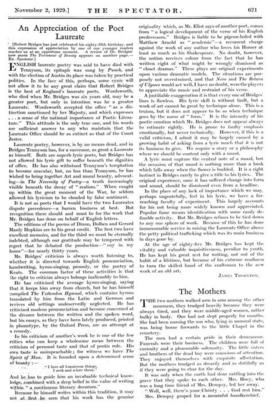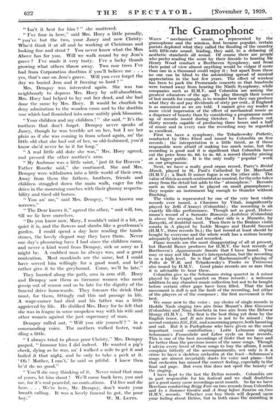The Mothers
rpm two mothers walked arm in arm among the other mourners, they trudged heavily because they were always tired, and they were middle-aged women, rather bulky in body. One had not slept properly for months. She had been nursing the son who, lying in unusual state, was being borne forwards to the little Chapel in the cemetery.
The men had a certain pride in their demeanour. Funerals were their business. The children were full of curiosity and a pleasurable solemnity. The little sisters and brothers of the dead boy were conscious of attention. They enjoyed themselves with exquisite affectation. But the mothers trudged as drearily and as dutifully as if they were going to char for the day.
It was only when the earth had done rattling into the grave that ,tliey spoke to each other. Mrs. Hoey, who was Jong time friend of Mrs. Dempsy, led, her away.
.".Well,. well, there's ;your .,christy_ , . , God, rest him."
• Mrs. _,Dernpsy :groped for .41.- giOnr4fid handkerchief. "Isn't it best for him ? " she muttered.
"I've four in here," said Mrs. Hoey a little proudly, "you've but the two, your Janey and now Christy. Who'd think it at all and he working at Christmas and looking fine and stout ? You never know what the Man Above has for you. Will we walk round by my Jem's grave ? I've made it very tasty. I've a lucky thumb growing what others throw away. Two rose trees I've had from Corporation dustbins if you'll believe me . . . yes, that's one on Jem's grave. Will you ever forget the day we buried 'Jem and it freezing so hard ? "
Mrs. Dempsy was interested again. She was too neighbourly to depress Mrs. Hoey by self-absorbtion. Mrs. Hoey had helped to lay out her dead, and she had done the same by Mrs. Hoey. It would be churlish to deny admiration to the wooden cross and to the dustbin rose which had flourished into some untidy pink blossoms.
"Your children and my children ! " she said. " It's the mothers that don't forget. Dempsy never speaks of Janey, though he was terrible set on her, but I see her plain as if she was coming in from school again, an' the little old chat she had out of her, so old-fashioned, you'd know she'd never be in it for long."
"A real little old dote she was," Mrs. Hoey agreed, and pressed the other mother's arm.
"My Ambrose was a little saint, just fit for Heaven' Father Rourke said," she continued. She and Mrs.
Dempsy were withdrawn into a little world of their own. Away from them the fathers, brothers, friends and children straggled down the main walk, eager for the drive in the mourning coaches with their gloomy respecta- bility and tired old horses.
"You an' me," said Mrs. Dempsy, "has known our sorrows."
"The Dear knows it," agreed the other, "and will, too, till we lie here ourselves.
"Do you know now, Mary, I wouldn't mind it a bit, so quiet it is, and the flowers and shrubs like a gentleman's garden. I could spend a day here reading the tomb- stones, the lovely elegant way they have them. Never one day's pleasuring have I had since the children came, and never a kind word from Dempsy, sick or sorry as I might be. A crabbed man he always was, and a great contention. Most mankinds -are the same, but I could have served him willingly for a good word, and he'd rather give it to the greyhound. Come, we'll be late."
They hurried along the path, arm in arm still. Hoey and Dempsy saw them as tiresome women who must gossip out of season and so be late for the dignity of the funeral drive homewards. They foresaw the drink that must, for them, fittingly end this sad passage in life. A wage-earner had died and his father was a little aggrieved by life. He disliked Mrs. Hoey for he felt that she was in league in some unspoken way with his wife and other women against the just supremacy of man.
Dempsy called out, "Will you stir yourself ? " in a commanding voice. The mothers walked faster, wad- dling a little.
"I always tried to please poor Christy," Mrs. Dempsy gasped, "humour him I did- indeed. He wanted a pig's cheek, dying as he was, an' I walked a mile to get it and boiled it that night, and he only to take a peck at it. ' Oh ! Mother, I can't,' he said so pitiful. I knew then he'd do no good."
"You'll die easy thinking of it. Never mind that man of yours, let him shout ! We'll come-back here, you and me, for it's real peaceful, no conteiltions. I'd-live and die here. . . . We're here, Mr. Dempsy, don't -Nsia-Ste your breath calling. It was a, lovely funeral he got, the poor boy.'
- M. LETTS.









































 Previous page
Previous page